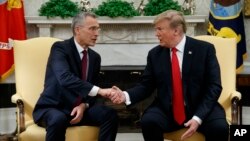Foreign ministers from countries belonging to the North Atlantic Treaty Organization are gathering in Washington to mark the 70th anniversary of the military alliance.
NATO is one of the oldest common defense alliances of its kind, and one of the most successful. The group includes Britain, France and Germany, but also has added countries such as Turkey and Greece that are not near the Atlantic Ocean.
NATO was formed to be an alliance of Western nations that would balance the military power of the Soviet Union and its allies in Eastern Europe. After the former Soviet Union collapsed in 1991, some experts questioned what part the alliance would play in international security.
Since that time, NATO members have taken part in conflicts in Kosovo, Iraq and Afghanistan. NATO also has expanded to include countries that were once part of the Soviet bloc. Croatia, the Czech Republic, Estonia, Lithuania, Latvia, Hungary, Poland and Romania were formerly allied to the Soviet Union.
Criticisms of NATO
U.S. President Donald Trump has criticized the group, both as a presidential candidate and after taking office in 2017. Trump has said that many NATO members do not spend enough on defense to meet their commitments fully under the agreement.
He suggested that NATO may no longer be useful. He once called it “obsolete.”
Trump’s criticism of the alliance has concerned European allies.
However, some U.S. officials have also been frustrated over European positions on some security issues affecting NATO. For example, Germany has planned an undersea gas pipeline with Russia. In addition, the U.S. is worried about Europeans' apparent lack of concern over security threats presented by China.
And some European members have sharply disagreed with the U.S. on expanding restrictions on Iran for its nuclear program and activities in the Middle East. They also have criticized the U.S. for withdrawing from a nuclear agreement with Russia – which, the U.S. says, Russia has not observed.
However, most foreign policy experts say NATO is a success.
Mark Simakovsky is with the Atlantic Council, a research group in Washington. He told VOA that NATO “has showcased an ability to adapt to change in the past” and it is dealing with issues like cyber warfare and spending more on defense.
Defense spending
Trump is not the first U.S. leader to call for NATO members to do more to defend their countries. President Barack Obama also pressed allies to spend more on defense. Other presidents have done so as well.
In 2014, NATO members agreed on spending what is equal to two percent of their economies on their militaries each year. Most have never reached that level. NATO’s 2018 report says 7 of its 29 member states reached the two percent spending promise.
Kurt Volker is director of the McCain Institute in Washington. He also served as the U.S. ambassador to NATO. Volker said defense spending shows a country’s commitment to its own security. He said such spending gives other NATO members confidence that the group can help defend that country.
Hans Jundnani is with the British research group Chatham House. He said Europe needs to do more to share the burden of common defense. In 2018, Britain supplied the most among European countries to the defense costs of the alliance.
Recently, a group of eight former British military and intelligence chiefs warned that Britain could drop from being a top military power unless it does more for its defense.
Central European countries continue to support the security guarantee that NATO provides. They note American support of military bases in the Black Sea area, the Baltic States and Poland.
On Monday, NATO Secretary-General Jens Stoltenberg announced an agreement to spend $260 million for military storage in Poland.
I’m Mario Ritter Jr.
Jamie Detmer and Cindy Saine reported this story for VOA News. Mario Ritter Jr. adapted it for VOA Learning English. Kelly Jean Kelly was the editor.
We want to hear from you. Write to us in the Comments section, and visit our Facebook page.
_____________________________________________________________
Words in This Story
bloc –n. a group of countries connected by a treaty or agreement
obsolete –adj. no longer used
adapt –v. to change in order to operate better or to be better able to meet needs
cyber –adj. related to computers and computer networks
confidence –n. the belief that someone has the ability to succeed at something
frustration –n. a feeling of annoyance at not being able to or being prevented from reaching some outcome






